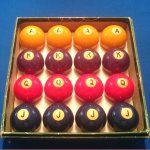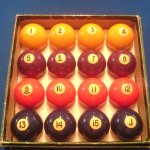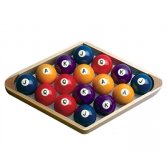Hiya,
I recently bought a set of poker pool balls by aramith. This is what the balls look like:


Unfortunately, there are not rules included with the set, so I don't actually know how to use these wonderful balls.
The first thing I did was searching the net. I found a lot of Poker Pool rules, but none of them seems to fit the set.
This is one example for the rules to be found quite often. The ball set shown in the post is the same, but the rules don't make sense with this set. What happens if the player in the given example pockets ball 11? It's also marked "Q" on the opposite side. This is just one point which shows that these rules cannot fit the set. Using the example given in the post, let's say player 1 breaks and fails to pocket a ball. Now it's player 2's turn. His cards in the example are two Queens, two Kings, 4, 6 and 8. He now manages to pocket the ball which is marked "Q" on one side and "12" on the other side. He still has to pocket "K", 4, 6 and 8. Of course he now wants to pocket the ball which is marked 8 on one side and "K" on the other side. But balls might be positioned in a way that all remaining purple balls lie "K" up. So what is he supposed to do? Pick up all the "K"-balls and look what's on the opposite side? Never ever! Hope that he manages to guess which ball has "8" on the opposite side? Would be pure luck! For me this shows that the rules can't really fit the set.
The second set of rules I came across when searching the net is definitely for a different set of balls, made by Crown Games which looks like this. As this set contains, e.g. an Ace of Spades and an Ace of Hearts it cannot be compatible to the aramith set, as in this set all Aces are yellow and it's impossible to distinguish them. Additionally, it contains four aces whereas the Crown Games set only contains two.
After searching the net with no usable results I posted on the German billiards forum, but it looks as if nobody plays Poker Pool in Germany and so nobody could help me although people tried hard mainly by providing links to rules like the ones above which I had already found before.
My last idea was to search Google Patents because I thought these balls may be patented. I found some patents for different sets of poker pool balls, but none of these are compatible with the set I bought.
So now my last resort is azbilliards. Hopefully, there will be someone who owns the same set and knows how to play it. It would really be fantastic to know how to rack the (16!) balls and how to play the game.
Thanks a lot in advance,
Marky
I recently bought a set of poker pool balls by aramith. This is what the balls look like:
Unfortunately, there are not rules included with the set, so I don't actually know how to use these wonderful balls.
The first thing I did was searching the net. I found a lot of Poker Pool rules, but none of them seems to fit the set.
This is one example for the rules to be found quite often. The ball set shown in the post is the same, but the rules don't make sense with this set. What happens if the player in the given example pockets ball 11? It's also marked "Q" on the opposite side. This is just one point which shows that these rules cannot fit the set. Using the example given in the post, let's say player 1 breaks and fails to pocket a ball. Now it's player 2's turn. His cards in the example are two Queens, two Kings, 4, 6 and 8. He now manages to pocket the ball which is marked "Q" on one side and "12" on the other side. He still has to pocket "K", 4, 6 and 8. Of course he now wants to pocket the ball which is marked 8 on one side and "K" on the other side. But balls might be positioned in a way that all remaining purple balls lie "K" up. So what is he supposed to do? Pick up all the "K"-balls and look what's on the opposite side? Never ever! Hope that he manages to guess which ball has "8" on the opposite side? Would be pure luck! For me this shows that the rules can't really fit the set.
The second set of rules I came across when searching the net is definitely for a different set of balls, made by Crown Games which looks like this. As this set contains, e.g. an Ace of Spades and an Ace of Hearts it cannot be compatible to the aramith set, as in this set all Aces are yellow and it's impossible to distinguish them. Additionally, it contains four aces whereas the Crown Games set only contains two.
After searching the net with no usable results I posted on the German billiards forum, but it looks as if nobody plays Poker Pool in Germany and so nobody could help me although people tried hard mainly by providing links to rules like the ones above which I had already found before.
My last idea was to search Google Patents because I thought these balls may be patented. I found some patents for different sets of poker pool balls, but none of these are compatible with the set I bought.
So now my last resort is azbilliards. Hopefully, there will be someone who owns the same set and knows how to play it. It would really be fantastic to know how to rack the (16!) balls and how to play the game.
Thanks a lot in advance,
Marky












